| Srl | Item |
| 1 |
ID:
154654
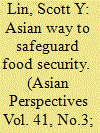

|
|
|
|
|
| Summary/Abstract |
During the twenty-first century's wave of transnational farmland investment, Asian countries contributed to about half of the investment. I therefore address the following major questions: What is the food security situation across Asian countries? What are the factors that drive Asian countries to join the transnational farmland investment movement? I argue that the following four factors give rise to the security problems in the food supply chain of Asian countries: (1) the developmental state model that leads Asian countries to sacrifice agriculture in their home countries; (2) the increases in food demand resulting from accelerated urbanization; (3) an unstable food supply chain causing Asian countries to seek reliable bases of food supply; and (4) food safety concerns that drive Asia to look for better quality farmlands. Today, as transnational farmland investment has become one of the models to maintain Asian countries' food security, this Asian model is also challenging contemporary global food security governance dominated by Western countries. The changes that it will effect over the course of this arduous process will also inform and shape future research within academia.
|
|
|
|
|
|
|
|
|
|
|
|
|
|
|
|
| 2 |
ID:
189018
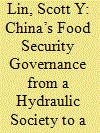

|
|
|
|
|
| Summary/Abstract |
Although the main purpose of food security governance in China is to increase grain yield, the traditional and contemporary methods employed to achieve food security governance differ in polemic terms. The traditional method relies on organizations such as peasant collectives to properly manage water and other natural resources on farmlands. The food security governance of traditional China can best be described as a “hydraulic society”. Shifting from a pre-capitalist to a capitalist model, the contemporary method is centered on several large-scale agricultural and food (A&F) corporations and involves the capitalization of grain production resources, genetic modifications of grain seedlings through science and technology, and intensive scales of grain production. A “corporate food regime” is, therefore, what best defines the governance mechanisms of food security in contemporary China. This paper aims to examine how the governance of food security has been reshaped by this emerging corporate food regime. Findings indicate that China’s food security governance has transformed into a corporate food regime to increase grain yield. In this regime, the Chinese government supports the establishment of a few large-scale A&F corporations, allowing them to have an oligopoly over the domestic grain market. Internationally, China has become a major investor through its transnational agricultural land grabbing. The formation of this new food security governance has not only affected the traditional Chinese culture of peasant collectives, but also challenged the global A&F market system. However, COVID-19 and the promulgation of the Biosecurity Law are likely to alter the development of China’s A&F corporations and its food security governance.
|
|
|
|
|
|
|
|
|
|
|
|
|
|
|
|
| 3 |
ID:
142200
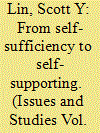

|
|
|
| 4 |
ID:
126133
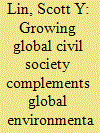

|
|
|
|
|
| Publication |
2013.
|
| Summary/Abstract |
Although the increasing influence of global civil society has been noted in environmental politics and this phenomenon is synonymous with global environmental governance, some questions remain: where does this change in mentality originate and through what forces, how are these forces motivated, and how do they continue to motivate the "environmental agenda"? A primary factor is the establishment of transnational institutions that stimulates the participation of global civil society in global environmental governance and how this participation has diminished government authority by reinforcing local loyalties with their viewpoints concerning the environment. Thus, the debate becomes how the interpretation of global environmental governance and "top-down" approaches affects and is affected by local practices in civil society. This study examines the growing importance of global civil society to the Lancang/Mekong fish catch- the world's largest inland fishery-and the dam project disputes concerning the Lancang/Mekong River. The following analysis concerns the influence of the rising global civil society on the effectiveness of these environmental governance entities. The analysis indicates that participation of the global civil society in the Lancang/Mekong dam decision-making process concerning the fisheries does not replace the traditional mechanism of governmental governance. Instead, the growing influence of the global civil society is compatible with operations of the governmental governance mechanism, complementing the function of global environmental governance.
|
|
|
|
|
|
|
|
|
|
|
|
|
|
|
|
| 5 |
ID:
120381
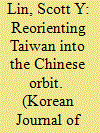

|
|
|
| 6 |
ID:
156248
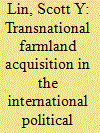

|
|
|
|
|
| Summary/Abstract |
A new wave of transnational farmland acquisition recently emerged, giving rise to two questions: What are the approaches in this wave of farmland acquisition and have relevant regulations been created for governance? Theories of international political economy are used to analyze the acquisition race, with two findings. First, grain-importing countries in Asia and the Persian Gulf region tend to use economic nationalism to conduct acquisition. Developed countries in the West tend towards liberalism, with market interests being the driving force behind acquisition, and the civil society of host countries in the South generally embrace both Marxism and liberalism, hoping to evaluate the acquisition process from perspectives of human rights and responsible farmland investment. Second, the existing governance regulations tend to favor investor countries’ interests, leaving host countries’ food security insufficiently protected.
|
|
|
|
|
|
|
|
|
|
|
|
|
|
|
|